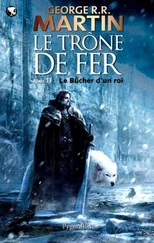“ Captain Kidd,” Kidd muttered under his breath. He no longer bothered correcting Sexton, but the omission still rankled, especially given how insistent Sexton was upon his own title of Doctor.
“This is the ship?” said Edmonds, Kidd’s old shipmate.
“Aye,” Kidd replied.
The grizzled old sailor stood silent for a long time, casting a practiced eye on the little ship as she bobbed in the Thames. Edmonds had responded eagerly enough to Kidd’s call for a quartermaster; they’d served together upon the Sainte Rose , and Kidd would trust him with his life.
“This’d be the strangest ship I’ve e’er served upon,” Edmonds said at last.
To that assertion, Kidd merely nodded. “I’ll not argue with that.”
The ship was tiny, barely seventy feet from stem to stern, and would carry a crew of only sixty men. But not only was she small, she seemed … spindly . Everything possible had been done to lighten her weight—bulkheads were screens woven from rattan rather than solid wooden panels, carved rails had been replaced by simple ropes, and canvas sheeting took the place of hatch covers. And Kidd knew of many other changes invisible to the eye, such as the deck planks planed down to half their usual thickness.
“But sweeps ?” Edmonds asked, incredulous, pointing to the row of oarlocks on either side. “In this day and age?”
Kidd set his chin. “I’d not sail without them. Wind and waves cannot be trusted, but a man at an oar can always be counted on to pull a ship out of trouble. Sweeps have saved my skin more than once.”
He did not mention that the sweeps that would be fitted to those oarlocks were made to push air, not water. Sexton had designed them to Kidd’s specifications, but Kidd could but hope they would work as well as Sexton promised—along with every other one of the thousand untried, theoretical pieces that made up the strange little ship.
Edmonds left off his critical inspection of the ship and turned to Kidd with a questioning eye. “D’ye think she’ll really swim?”
Kidd nodded. “She’s a strange one, all right, but there’s a reason for it, and if you’ll sign on with me, you’ll learn what it is.”
“Aye, but do ye trust her?”
There came a long, considering pause then.
It didn’t really matter what Kidd thought. He was bound by the terms of his pardon to sail with Sexton, no matter the circumstances, and not to reveal the reason. But still, he felt he owed his old shipmate an honest answer.
Though many of Sexton’s designs seemed completely daft at first, the man had an enormous brain, and where Kidd could follow his logic, it seemed unassailable. And Kidd himself had supervised the ship’s construction and provisioning, using the best men and materials the king’s money could buy. If he could assemble a whole crew as good as Edmonds …
“I trust her well enough to sail in her myself,” Kidd said. “And it’ll be a long, long journey.” In miles, at least , he added silently, though Sexton theorized it would take but two months all told. There were no plans to land upon Mars, merely to survey it for a later expedition.
Edmonds pursed his lips a long moment, then with a firm nod of his chin he stuck out his hand. “If she’s good enough for Captain Kidd, she’s good enough for me.”
With genuine pleasure, Kidd took Edmonds’s hand and shook it. “Welcome aboard, Mr. Edmonds. Welcome aboard the Mars Adventure .”
Kidd shielded his eyes from the rising sun, trying to ignore the babble of the crowd on the wharf as he inspected the ship’s bizarre rigging.
He had warned the king that rumors would begin to spread once the crew was hired, and, indeed, in the last few weeks the press of the public for more information on the strange ship, with her secret mission and her infamous captain, had become intense. But Kidd kept a tight rein on his men and kept Sexton busy with his drafts and charts, so that little real news had gotten out. But when they’d begun to inflate the balloons after sunset last night, word had traveled fast and the rabble had begun to gather almost immediately.
Soon everyone would know the secret of the Mars Adventure .
Nine balloons bobbed and swayed above the little ship, nine taut white globes of fine China silk filled with coal-warmed air, glowing like enormous pearls in the light of the rising sun. Already the ship rode impossibly high in the water, and the tug of the Thames on her keel combined with the action of the breeze on her balloons to give her a sick, disturbing motion unlike anything Kidd had ever experienced before. Sexton had assured Kidd that, once airborne, the ride would be smooth.
“Make fast that stay, there!” Kidd called, pointing. The bosun repeated his order, and two of the men scrambled up the great purse of netting that restrained the balloons to repair the flaw Kidd had spotted. Stays was what Kidd and the men called the great ropes that held the balloons to the ship, though they were no true stays at all; so much was new and unprecedented in this ship that they’d been forced to stretch existing sailing language to cover it all. It was better than the Latin that Sexton insisted on using.
Sexton appeared at Kidd’s elbow. “Are we nearly ready to depart?” he said, his eyes darting about. “We must rise with the sun or the lift will be insufficient.”
“Very nearly,” Kidd replied, turning his attention to the wharf. “We only await … ah, there he is.”
The crowd parted like the Red Sea before a surging retinue of colorful and bewigged gentlemen, in the midst of which the king strode like Moses. As word spread through the crowd, heads bowed in rings like ripples from a dropped stone.
“Good morrow to you, my subjects!” the king called once the clamor of his arrival had subsided. “I bring you good news! On this most momentous day, a new era of exploration and discovery dawns for England! Today my philosopher, John Sexton, together with a brave crew of handpicked men, sets sail on a most extraordinary voyage … an expedition to the planet Mars!”
Pandemonium. Cheers, gawps of astonishment, and hoots of derision greeted the king’s announcement. Some of the most amazed reactions came from the crew, many of whom had greeted Kidd’s revelation of the ship’s destination with knowing winks and the assumption that the real purpose of the voyage would be disclosed later.
For his own part, Kidd, bristling at his own dismissal as merely part of “Sexton’s crew,” whispered a few commands to his bosun. “Aye, sir,” the bosun replied, and scurried off to pass the word to the rest of the men.
Kidd understood that the king might wish to distance himself from a notorious, though pardoned, pirate. But he didn’t have to like it, and he wasn’t going to let the slight go unpunished.
If the king wanted a momentous day, he would have one.
On the wharf, the king blathered on and on, while Sexton peered through his fingers at the ever-rising sun. “We’re losing too much time!” he whispered to Kidd.
“Patience,” Kidd replied.
Just then, the bosun returned. “All’s ready,” he murmured in Kidd’s ear.
Kidd grinned. “On my signal.”
“This is a marvelous day for England,” the king declaimed, “and for the glorious House of Orange-Nassau …”
That was more than enough royal self-aggrandizement for Kidd. He turned and bellowed, “Cast off! Away ballast!”
In one coordinated motion, sailors in the four corners of the ship slipped the mooring lines that held the ship down. A moment later came a rushing rumble from belowdecks, as other men opened the valves that let the ship’s ballast—thousands of gallons of Thames water, rather than the usual stones—run out to rejoin the river.
Читать дальше












